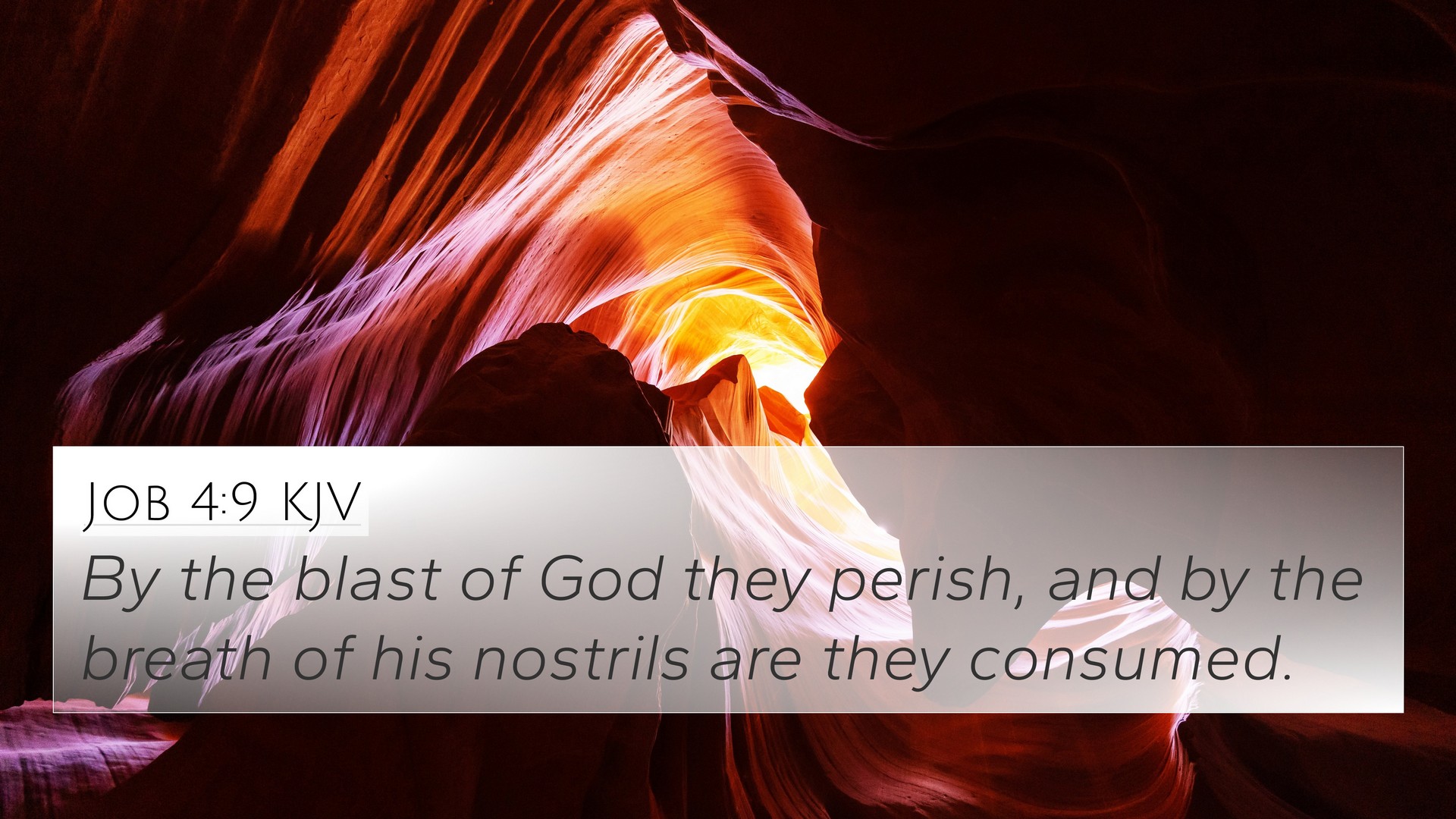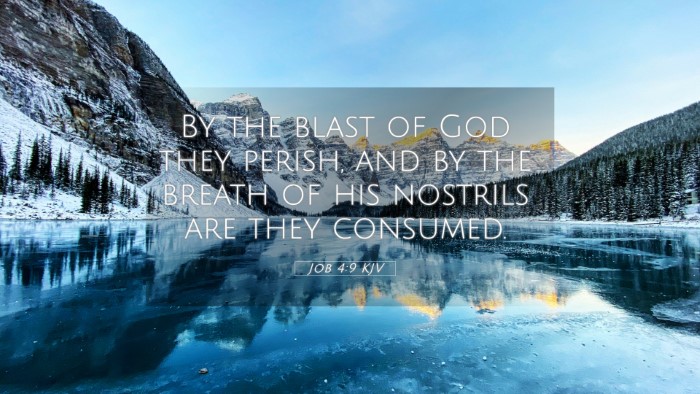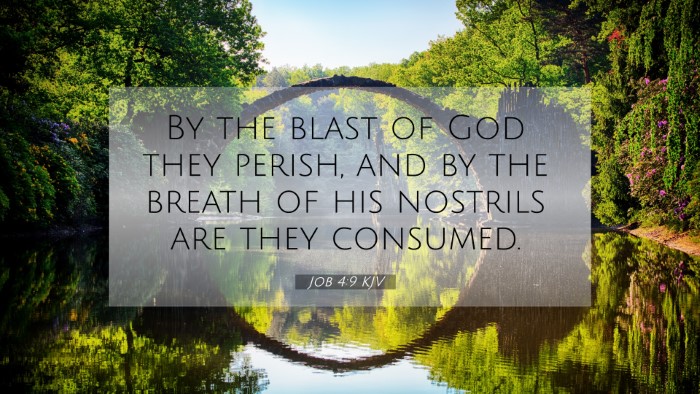Old Testament
Genesis Exodus Leviticus Numbers Deuteronomy Joshua Judges Ruth 1 Samuel 2 Samuel 1 Kings 2 Kings 1 Chronicles 2 Chronicles Ezra Nehemiah Esther Job Psalms Proverbs Ecclesiastes Song of Solomon Isaiah Jeremiah Lamentations Ezekiel Daniel Hosea Joel Amos Obadiah Jonah Micah Nahum Habakkuk Zephaniah Haggai Zechariah MalachiJob 4:9 Similar Verses
Job 4:9 Cross References
By the blast of God they perish, and by the breath of his nostrils are they consumed.
Uncover the Rich Themes and Topics of This Bible Verse
Listed below are the Bible themes associated with Job 4:9. We invite you to explore each theme to gain deeper insights into the Scriptures.
Job 4:9 Cross Reference Verses
This section features a detailed cross-reference designed to enrich your understanding of the Scriptures. Below, you will find carefully selected verses that echo the themes and teachings related to Job 4:9 KJV. Click on any image to explore detailed analyses of related Bible verses and uncover deeper theological insights.
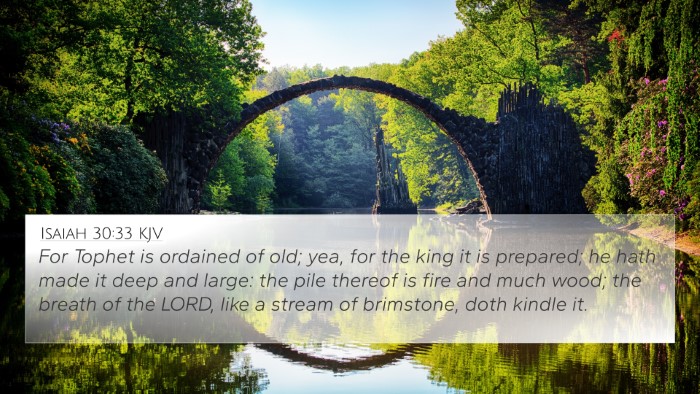
Isaiah 30:33 (KJV) »
For Tophet is ordained of old; yea, for the king it is prepared; he hath made it deep and large: the pile thereof is fire and much wood; the breath of the LORD, like a stream of brimstone, doth kindle it.
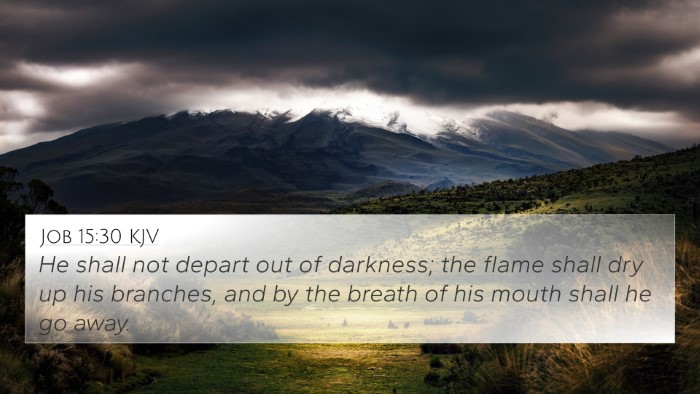
Job 15:30 (KJV) »
He shall not depart out of darkness; the flame shall dry up his branches, and by the breath of his mouth shall he go away.
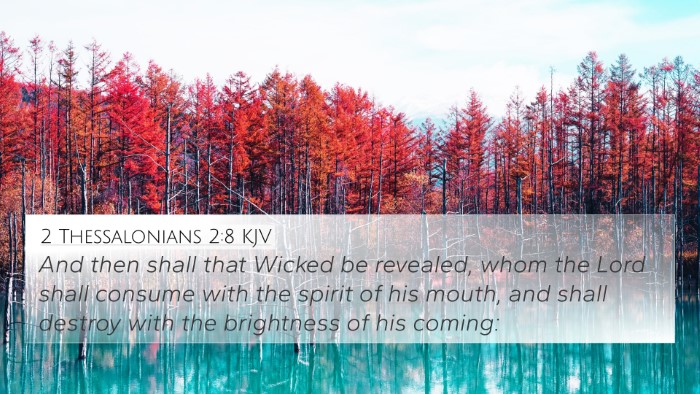
2 Thessalonians 2:8 (KJV) »
And then shall that Wicked be revealed, whom the Lord shall consume with the spirit of his mouth, and shall destroy with the brightness of his coming:
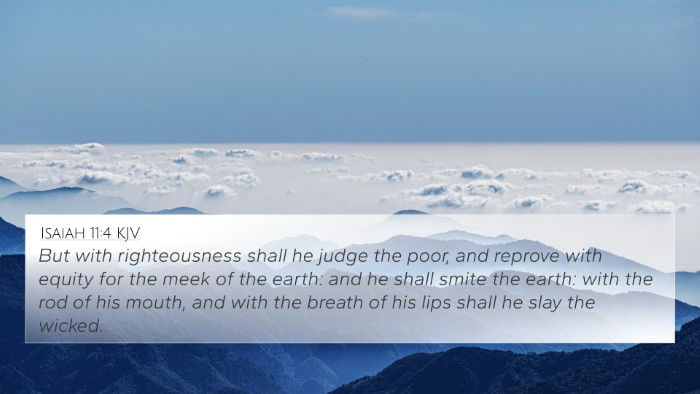
Isaiah 11:4 (KJV) »
But with righteousness shall he judge the poor, and reprove with equity for the meek of the earth: and he shall smite the earth: with the rod of his mouth, and with the breath of his lips shall he slay the wicked.
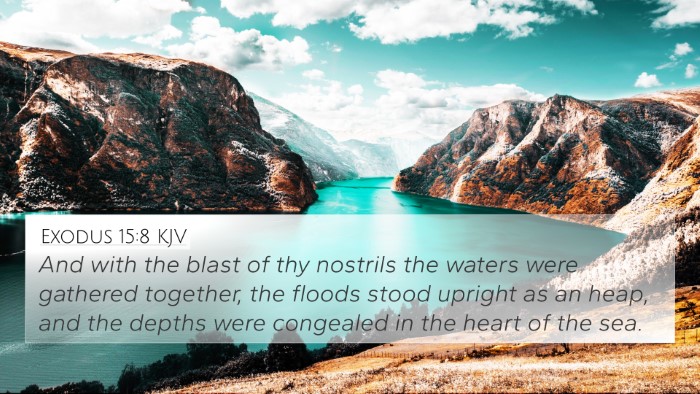
Exodus 15:8 (KJV) »
And with the blast of thy nostrils the waters were gathered together, the floods stood upright as an heap, and the depths were congealed in the heart of the sea.
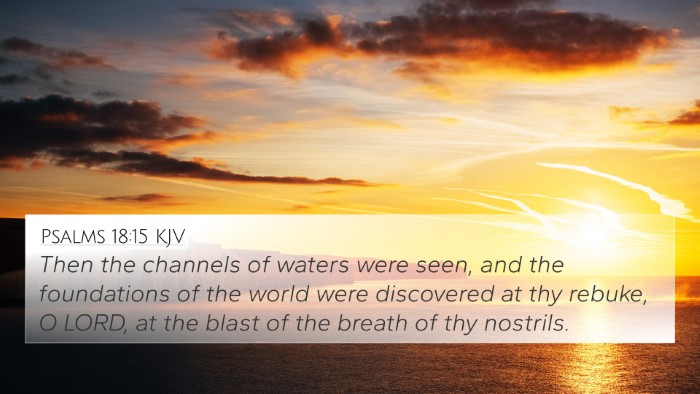
Psalms 18:15 (KJV) »
Then the channels of waters were seen, and the foundations of the world were discovered at thy rebuke, O LORD, at the blast of the breath of thy nostrils.
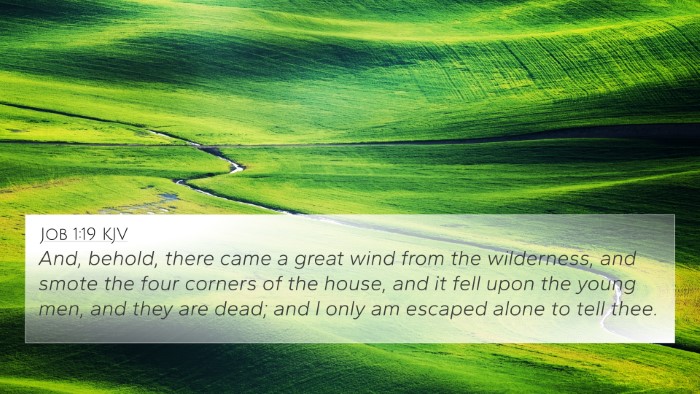
Job 1:19 (KJV) »
And, behold, there came a great wind from the wilderness, and smote the four corners of the house, and it fell upon the young men, and they are dead; and I only am escaped alone to tell thee.
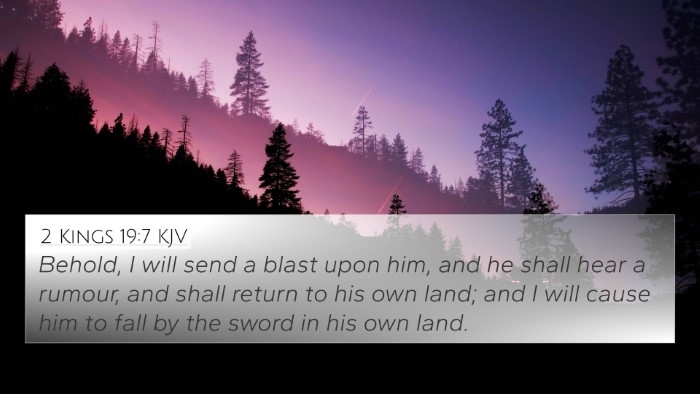
2 Kings 19:7 (KJV) »
Behold, I will send a blast upon him, and he shall hear a rumour, and shall return to his own land; and I will cause him to fall by the sword in his own land.
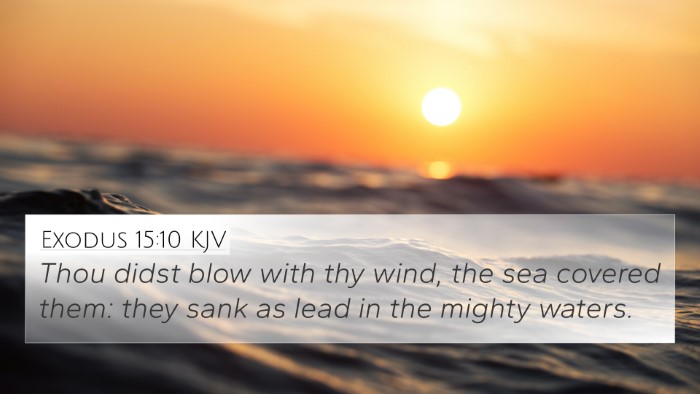
Exodus 15:10 (KJV) »
Thou didst blow with thy wind, the sea covered them: they sank as lead in the mighty waters.

Revelation 2:16 (KJV) »
Repent; or else I will come unto thee quickly, and will fight against them with the sword of my mouth.
Job 4:9 Verse Analysis and Similar Verses
Understanding Job 4:9
Job 4:9: "By the blast of God they perish, and by the breath of his nostrils are they consumed."
This verse is a part of the discourse involving Eliphaz the Temanite, who attempts to explain Job's suffering through divine principles. In understanding Job 4:9, we engage with critical insights from esteemed public domain commentaries, which illuminate the verse's theological significance.
Verse Meaning and Interpretation
Matthew Henry's Commentary:
Henry notes that this verse suggests the overwhelming power of God in creation and judgment. The 'blast of God' indicates the might with which God operates, showcasing that all natural things are contingent upon His will. The imagery of breathing suggests that God's mere intention can lead to destruction; thus, the natural order exists at His pleasure.
Albert Barnes' Commentary:
Barnes emphasizes the strict connection between divine breath and the fate of humanity. He contextualizes the idea that God’s breath symbolizes His divine spirit, which sustains life and can just as easily bring about death. This reflects not just on individual demise but the fate of nations, underscoring a universal principle of accountability to God.
Adam Clarke's Commentary:
Clarke interprets this verse within the broader narrative of Job’s suffering, highlighting that Job was being reminded of his dependence on God. Clarke points out the notion that, in the face of affliction, one should remember the grandeur of God’s sovereignty over all existence.
Thematic Bible Verse Connections
The verse connects with several themes in Scripture regarding God’s sovereignty, the nature of human suffering, and divine retribution. Understanding these connections can enhance our grasp of biblical theology:
- God's Sovereignty: Psalm 33:6-9 - "By the word of the Lord were the heavens made; and all the host of them by the breath of his mouth."
- Divine Accountability: Romans 14:12 - "So then each of us will give an account of himself to God."
- The Nature of Suffering: Romans 8:18 - "For I consider that the sufferings of this present time are not worth comparing with the glory that is to be revealed to us."
- Divine Judgment: Hebrews 10:31 - "It is a fearful thing to fall into the hands of the living God."
- The Breath of Life: Genesis 2:7 - "Then the Lord God formed the man of dust from the ground and breathed into his nostrils the breath of life, and the man became a living creature."
- God's Authority: Isaiah 40:25-26 - "To whom will you compare me, or who is my equal? says the Holy One. Lift up your eyes and look to the heavens: who created all these?"
- The Fragility of Life: James 4:14 - "What is your life? For you are a mist that appears for a little time and then vanishes."
- God's Design: Ephesians 1:11 - "In him we have obtained an inheritance, having been predestined according to the purpose of him who works all things according to the counsel of his will."
- The Power of God's Word: Isaiah 55:10-11 - "For as the rain and the snow come down from heaven... so shall my word be that goes out from my mouth."
- The Ultimate Redemption: Philippians 3:20-21 - "But our citizenship is in heaven, and from it we await a Savior, the Lord Jesus Christ, who will transform our lowly body to be like his glorious body."
Cross-Referencing Biblical Texts
When analyzing Job 4:9 through the lens of cross-references, we find a rich tapestry of linked themes that span the Testaments. These connections facilitate a comprehensive understanding of God’s omnipotence and the human condition:
Tools for Bible Cross-Referencing:
- Bible Concordance - A valuable resource for finding terms and their occurrences throughout Scripture.
- Bible Cross-Reference Guide - A tool to discover related verses and themes in context.
- How to Use Bible Cross-References - Guidelines for effectively leveraging references in study.
Conclusion
Job 4:9 serves as a poignant reminder of God's sovereign and powerful will over the forces of nature and the human experience. By studying this verse in conjunction with its cross-references, believers can gain a deeper appreciation for the overarching narrative of Scripture, which consistently emphasizes God’s control and the necessity of humility before divine authority. By employing tools for Bible cross-referencing and engaging in comparative studies, individuals can unlock the cohesiveness of biblical themes, leading to a fuller understanding of God's word and its application in life.
